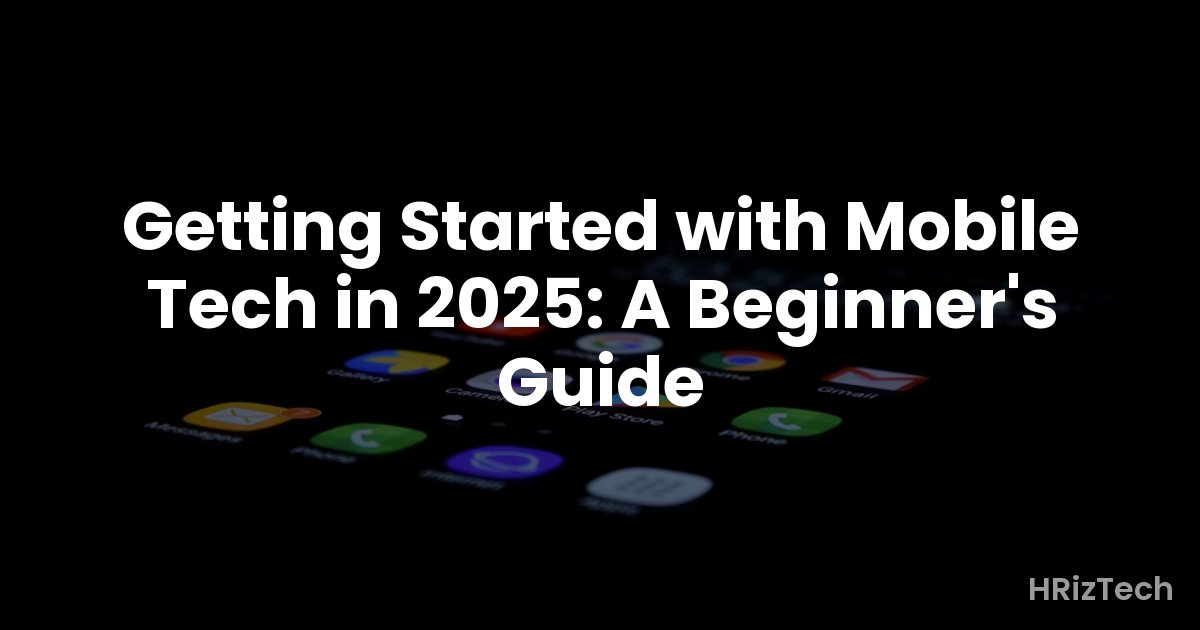Getting Started with Mobile Tech in 2025: A Beginner's Guide

Getting Started with Mobile Tech in 2025: A Beginner's Guide
- Mobile tech is evolving rapidly, but getting started is easier than you think.
- Understanding key terms and concepts is crucial for navigating the landscape.
- Prioritize your needs and budget when choosing devices and services.
- Explore different operating systems and app ecosystems.
- Stay updated on the latest trends and advancements.
Understanding the Mobile Tech Landscape
The mobile tech world can feel overwhelming, especially for newcomers. We're bombarded with terms like 5G, foldable phones, AI-powered assistants, and more. But don't worry! This guide breaks down the essentials, helping you navigate this exciting space with confidence. The key is to start with the basics and build from there.
Choosing Your Operating System: iOS vs. Android
The first major decision is selecting an operating system (OS). You'll primarily find two dominant players: Apple's iOS and Google's Android. iOS, known for its user-friendly interface and tightly controlled ecosystem, is found on iPhones and iPads. Android, on the other hand, is an open-source OS used by a vast array of manufacturers, offering a wider range of devices and customization options. The "best" OS depends entirely on your preferences and priorities.
iOS users often appreciate its simplicity and seamless integration across Apple devices. Android users, meanwhile, enjoy the flexibility to personalize their devices and choose from a broader spectrum of hardware options, often at more competitive price points. Consider factors like app availability (both ecosystems boast millions of apps, but some are exclusive), ease of use, and your existing tech ecosystem (if you're already invested in Apple products, sticking with iOS might be simpler).
Essential Mobile Tech Terms
Familiarizing yourself with common terms will significantly improve your understanding. Here are a few key ones:
- 5G: The fifth generation of wireless technology, offering significantly faster speeds and lower latency than previous generations.
- eSIM: An embedded SIM card, eliminating the need for a physical SIM card.
- Foldable Phones: Smartphones with screens that can fold, offering larger screen real estate in a more compact form factor.
- AI-Powered Assistants: Virtual assistants like Siri (iOS) and Google Assistant (Android) that can perform tasks, answer questions, and provide information.
- Mobile Payments: Contactless payment systems like Apple Pay and Google Pay, allowing for quick and secure transactions.
Choosing Your First Mobile Device
With the basics covered, let's discuss selecting your first (or next) mobile device. Consider these factors:
Budget
Mobile devices range in price from budget-friendly options to high-end flagships. Establish a realistic budget before you start shopping. Remember that the price often reflects the device's capabilities and features, but there are excellent options available at various price points.
Features and Specifications
Think about your needs. Do you need a powerful processor for gaming or demanding apps? How much storage space do you require? What camera quality is important to you? Research different models and compare their specifications to find the best fit for your usage patterns.
Screen Size and Type
Screen size is a matter of personal preference. Larger screens offer more viewing area, but may be less portable. Consider the type of screen as well – OLED screens offer superior contrast and deeper blacks, while LCD screens are generally more affordable.
Battery Life
Battery life is critical. Look for devices with long-lasting batteries, especially if you're a heavy user. Check reviews and benchmarks to get an idea of real-world battery performance.
Exploring Mobile Apps and Services
Once you have your device, the real fun begins! The app ecosystem is a vast landscape of possibilities. Explore different app categories, from productivity and communication to entertainment and gaming. Discover apps that enhance your daily life and help you achieve your goals.
App Stores
iOS devices use the App Store, while Android devices utilize the Google Play Store. Both offer millions of apps, but their selection and curation differ slightly. Familiarize yourself with each store's features and navigation.
Security and Privacy
Always download apps from official app stores to minimize the risk of malware. Be mindful of the permissions apps request and only grant access to necessary data. Regularly update your apps to benefit from security patches and bug fixes.
Staying Updated in the Fast-Paced World of Mobile Tech
The mobile tech landscape is constantly evolving. To stay informed, follow tech blogs, websites, and social media accounts dedicated to mobile technology. Read reviews, watch videos, and engage with online communities to learn about the latest trends and advancements.
Don't be afraid to experiment and try new things. The world of mobile tech is exciting and empowering. Embrace the learning process and enjoy the journey!
Key Takeaways
- Choose your operating system (iOS or Android) based on your preferences and needs.
- Set a budget and research devices based on your specific requirements.
- Explore the vast app ecosystems and find apps that enhance your productivity and entertainment.
- Stay updated on the latest trends and advancements by following relevant tech resources.
So, what are your biggest challenges or questions when it comes to getting started with mobile tech in 2025? Let's discuss in the comments below!
Comments
No comments yet. Be the first to comment!